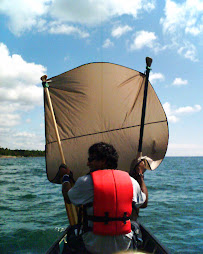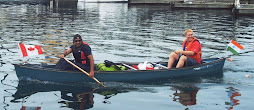
"It is good to have an end to journey toward; but it is the journey that matters, in the end." Ursula K. Le Guin
Yes, we did it ....... 22 days of adventure and experiences of a lifetime.......
Special thanks goes to Birgit, our Chief Communications Officer and Media Executive :-), and Rick from Tony Martin's office for coordinating the recent media event........
Check out the coverage at these links.
http://sootoday.com/content/news/full_story.asp?StoryNumber=28339
http://www.saultstar.com/ArticleDisplay.aspx?e=766136
http://soonews.ca/viewarticle.php?id=14798
Ben and Ross
Zoom in on the map below for a view of the route with stops.....
View Larger Map
Check out the links near the bottom of the blog to a few other recent content from other trips like this one.
http://en.wikipedia.org/wiki/Sir_Alexander_Mackenzie_Canada_Sea-to-Sea_Bicentennial_Expeditions
The classic 1960's NFB production "The Voyageurs" that spawned journeys like this.
What sets a canoeing expedition apart is that it purifies you more rapidly and inescapably than any other. Travel a thousand miles by train and you are a brute; pedal five hundred on a bicycle and you remain basically bourgeois; paddle a hundred in a canoe and you already a child of nature.– Pierre Elliott Trudeau
Here's an excerpt from an interesting critical look at "fur trade route" canoe trips.
http://findarticles.com/p/articles/mi_qa3683/is_200610/ai_n17194034/ (dead link)
The canoe is often represented in Canadian popular culture as a founding myth of nationality. Voyageur canoe routes represent cultural diversity and "the three founding peoples" of Canada, highlighting the foundational role of the landscape in Canadian identity, and emphasizing Canadian unity. The canoe appeals to Canadians because it offers an adventurous escape from the city, an imaginative encounter with history, a discovery of national identity, and an opportunity for a spiritual quest within nature (Francis 1997, 149-51). For Francis, this significance "emerges" from a survey of our national history, in which, as he states, "The canoe is omnipresent" (129). He recounts a history stretching from the First Nations birchbark canoe, through the Jesuit missionaries, to "our familiar textbook heroes, the explorers" (131), early twentieth-century Ontario summer camps, and Pierre Trudeau, tracing the way that the canoe links all these disparate events and individuals in a single narrative. (Dr. Misao Dean;Journal of Canadian Studies. Volume: 40. Issue: 3. Publication Date: Fall, 2006.)






No comments:
Post a Comment